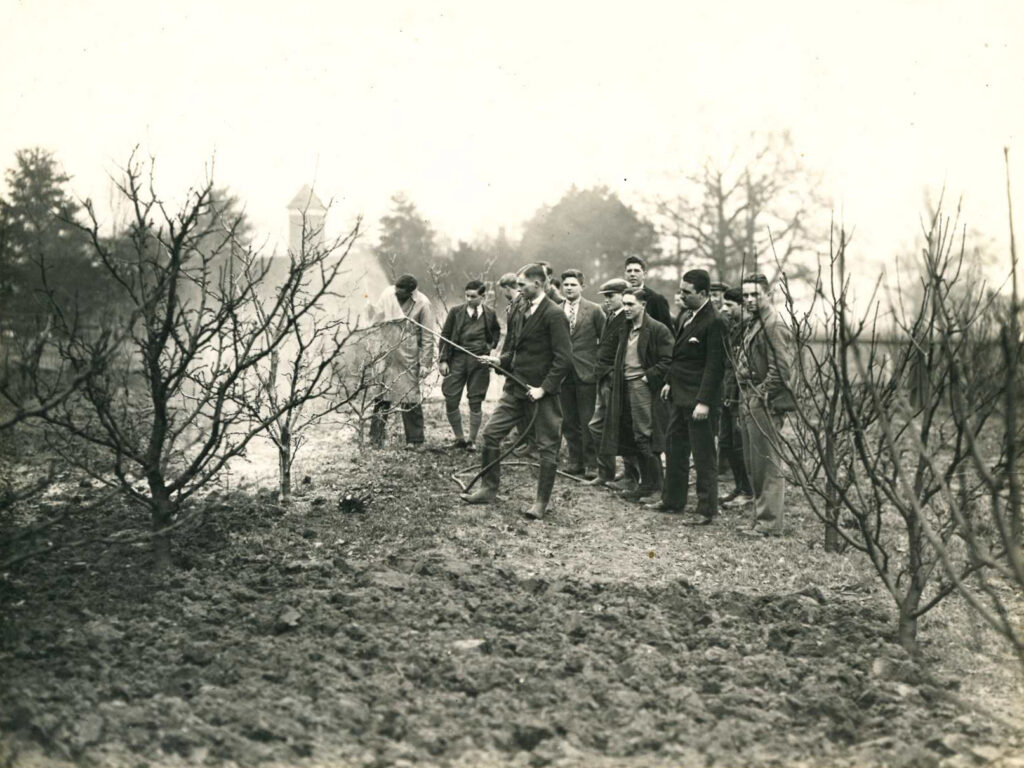*Photo taken during a horticulture lesson in 1926*
‘A very old student looks back’: article written by Arthur L Barritt, who studied Horticulture at Reaseheath from 1931 – 1933. It was sent for inclusion in the Reaseheath Association 1962 edition.
Since leaving Reaseheath in 1933 it may be fairly pertinent to say that a great deal of water has flowed under Henhull bridge. Looking back to the two years I spent as a horticultural student, I can truthfully say that those were the happiest I can recall: two complete seasons of varied, interesting and pleasant recollections. I have always been blessed (or cursed) with a very retentive memory, and to try and record here all that had passed since those halcyon days would be impracticable. I will, therefore, try and give some general impressions of the road on to which I was launched on becoming an “Old Student”.
Those years in the early thirties were, for the country as a whole, troubled. We had seen the “hunger marchers” on their way from the northern industrial towns to Westminster. This depressed state of commerce was reflected in the horticultural industry as well, and those of us who had chosen this trade were made well aware that our path was not going to be easy.
I was more fortunate than most in having a young fruit farm, belonging to my family, awaiting my services. Before I entered full employment there, I spent over two years as an apprentice to three different farmers in Southern England, and by the time I returned to the family business in 1936, trade was on the upgrade, and the position of growers rather more stable. There was compensation for the grower in those days. Labour was comparatively cheap, and the cost of living not excessive. The average land workers received 32s. per week, and it is safe to say that anyone in receipt of more than this, in say a foreman’s position or similar, was comparatively prosperous. As is generally known now, there were clouds on the horizon, certainly, no larger than a man’s hand, but they were there. For the rest we knew, or thought we knew, the answer to our nutritional problems. Fertilisers were cheap, as was F.Y.M Nicotine, derris and tar-oil controlled our insects. Sulphur and copper controlled our diseases. What more could we want, except an extra penny on the price of apples? I well remember the satisfaction we felt when Lane’s Prince Albert made 1 1/2 d. per pound or 5s. per bushel on the markets.
Then came 1939. Everyone joined something. If you were on the land you became a part-time fireman or Home Guard. Technical progress almost came to a stop. It was a case of making do with restricted supplies of everything. Growers’ meetings gave way to Defence Services and nights of part-time duty. There was a tight clamp on building or planting up new orchards. I was desirous of getting married at the time, and the only way we could find somewhere to live was to offer my services to a grower with a large acreage and a house available. As my family were all present, this presented me with no great problem and gave me the opportunity to widen my experience further. I spent the major part of the war in Gloucestershire, and learned the value of sunshine and livestock.
On returning to Cheshire the period of reconstruction with its stimulus to industry was very evident. As usual, our “poor relation” industry did not remain on the bandwagon for long. People soon forgot that they had walked miles, and had picked their own blackcurrants. The shortage of eggs remained a little longer but carried no great weight. After all there is a limit to what one can eat, but no limit to what one can look at. So, a T.V. set became far more important than a balanced diet of good fresh vegetable. The experience in pig-keeping stood me in good stead, and I was able to adapt our holding to combined operations.
My chief impression of the fifties is the rate at which industry was able to expand and spread its tentacles. Our holding was situated in open country within “easy reach” of markets in 1934. By 1954 industrial development was knocking at the gate. No enterprising firm desired to buy orchard land, but it made it very difficult for the orchard to carry on. It was then I decided that I had better switch again before it became too late, and I asked Mr. Fairbank who taught me at Reaseheath and who was Director of Luddington Experimental Station, if he could give me a job. Since I came to Luddington I have succeeded in passing the N.D.H. Intermediate Examination, thus taking up the threads where I left off in 1933. I still recall the atmosphere of lectures and learning of those days. It is to be hoped I can show appreciation of the good start afforded me by those very able teachers, by succeeding in the final examination.
I end up by saying that the opportunities offered to aspiring students are greater than ever before. My one lasting impression still is that the School of Agriculture is a very fine institution and long may it be so.

